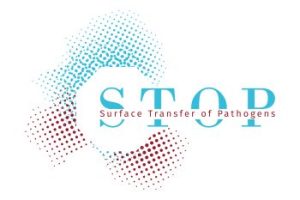Program duration: 01/09/2022 - 01/09/2026
STOP – Transport of pathogens through surfaces

“STOP – Transport of pathogens through surfaces”
Prolepsis Institute is a partner in a new European Horizon Europe project entitled “STOP – Transport of pathogens through surfaces”. The project was officially launched on September 1st, 2022 with a duration of four (4) years. The STOP project is coordinated by the Federal Institute for Materials Research and Testing (BAM) in Berlin while it includes organizations with many years of experience in the fields of materials science, biology, health and social care in Europe, as well as academic institutions and government bodies.
It is known that the transfer of pathogens can occur from various surfaces to hands and vice versa. Contamination through these surfaces is a potential threat to human health. Even if we do not know the exact significance of this route of infection, it is a reasonable preventive measure to try to reduce the transmission of infections through this particular route, especially in the context of a global pandemic. Cleaning or disinfecting surfaces is a common practice to reduce the environmental burden of pathogens, but studies conducted to investigate the effectiveness of surface disinfection showed that disinfected surfaces continued to be contaminated by pathogens. In addition, the disinfection of surfaces takes only a short time, and studies have shown that even multiple rounds of disinfection may not be sufficient to eliminate some pathogens. Therefore, a more powerful and long-term solution to the problem of transmission of pathogens through surfaces is desirable.
The overall objective of this project is to propose practicable surface coating solutions for frequently touched (‘high traffic’) areas, to significantly decrease the risk of pathogen transmissions from surfaces to hands and vice versa to STOP the spread of human infections. We aim at proposing versatile and efficient nanomaterials that could be used as components of antimicrobial coatings on hard surfaces used in or sprayed to frequently used areas.
The STOP consortium consists of 15 organizations from 10 countries: Germany, Greece, United Kingdom, Switzerland, Romania, Bulgaria, Estonia, Croatia, Finland and Italy.
___________________________________________
Coordinator:
Federal Institute for Materials Research and Testing (BAM), Germany
___________________________________________
Program Partners:
1. The University Of Birmingham, United Kingdom
2. Universita Degli Studi Di Trieste, Italy
3. Ruder Boskovic Institute, Hungary
4. Institut Pro Elektronika Na Ban – Institute Of Electronics Bulgarian Academy Of Sciences, Bulgary
5. Fraunhofer Gesellschaft Zur Foerderung Der Angewandten Forschung E.V., Germany
6. Bundesanstalt Fuer Materialforschung Und -Pruefung, Germany
7. Satakunnan Ammattikorkeakoulu Oy, Finland
8. Tartu Ulikool, Estonia
9. Idryma Technologias Kai Erevnas, Greece
10. King’s College London, United Kingdom
11. Eidgenossische Materialprufungs- Und Forschungsanstalt Chamanuensis Gmbh, Switzerland
12. Affix Lab, Finland
13. Apel Laser, Romania
14. Amanuensis Gmbh, Switzerland
15. Prolepsis Institute, Greece
___________________________________________
Contact info:
Nikole Papaevgeniou, PhD: n.papaevgeniou@prolepsis.gr
___________________________________________
Program website: STOP – Surface Transfer of Pathogens project (stop-pathogens.eu)




